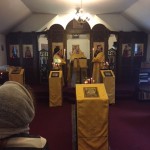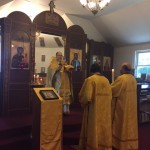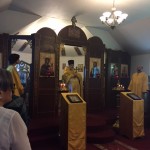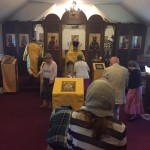On September 16, on the 16th Sunday after Pentecost, the Rector of St. George Church, Archpriest Igor Tarasov served the Divine Liturgy at our Parish. Following the Gospel lesson he preached a homily in Russian.
The Rector offered two kinds of interpretation of the parable on the talents (Mt. 25, 14-30). The earthly and simple sense of the parable is that God gives people different gifts. We in America declare: “All men are created equal”, and this is true but only to some extent. We are made equal by God and all of us are His children who are dear to Him, thus we should have equal rights and opportunities. However, in everything else there is nothing that makes us equal. Everybody is different in his or her abilities and talents. This is why in the parable the lord gave different sums of money to his different servants, according to everyone’s ability (Mt. 25, 15). But we should note that every servant received at least one talent: every man who is born receives at least one gift from God.
However, if we think of it, we may see that every person has more than one talent. For instance, a good engineer in his spare time may be a good cook or a good artist. The Lord is very generous to many of us. And it depends on us how we use those talents in our life. We may be very successful using them or we may bury them in the ground and not achieve much.
The spiritual interpretation of the parable suggests that the talents are the gifts of the divine grace. They are the gifts of the Holy Spirit that are generously given to us by God. And again, in we are not equal in acquiring of those gifts. Some Saints were blessed earlier, some later. St. John the Baptist, for example, was pious already in the womb of his mother and greeted the Son of God and His Blessed Mother when Mary visited Elizabeth. St. Nicholas and St. Sergius of Radonezh were blessed in their early childhood and refused to be nursed on Wednesdays and Friday, on the days of fast. But Holy Apostle Paul converted only in his mature age. Thus we are not equal in God’s gifts but we receive them and need to multiply those talents. It means that we have to grow in our devotion, in spiritual life and in our salvation. For instance, if we pray once a day, we should start praying twice a day, then we should pray before and after meals. If we come to church on great holy days, we should begin coming every Sunday. If we go to confession once in a while, we should begin to confess more often. We should not stop but should progress to receive more gifts of grace. And, on the opposite, if we won’t progress in our spiritual talents, we may lose even those gifts that we had.
The Rector concluded his homily by calling the faithful to ask the God’s help to grow our faith, to cultivate our piety and to multiply our spiritual talents. Then at the end we may hear the words of praise from today’s parable: “Well done, good and faithful servant; you were faithful over a few things, I will make you ruler over many things. Enter into the joy of your lord” (Mt. 25, 21).
During the Litany of Fervent Supplication the Rector proclaimed two additional petitions for the preservation of the unity of the Orthodox Church that according to the decision of the recent session of the Holy Synod have been blessed to take in all Russian churches due to the actions of the Patriarchate of Constantinople.
After the Liturgy dismissal the Rector preached a brief sermon in English addressing the ideas of his Russian homily.
Following the liturgical celebration the Rector and parishioners enjoyed delicious meals and an interesting conversation at the coffee hour.




